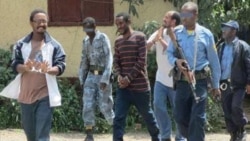On July 18, a group of Ethiopian bloggers and journalists detained for nearly three months were charged under the Anti-Terrorism Proclamation.
The six bloggers, who are part of a group known as Zone Nine, and three independent journalists were arrested in April, prompting an outcry from international human rights and press freedom groups who said the case was an assault on press freedom.
The United States is deeply troubled by the government of Ethiopia’s decision to charge Ethiopian journalists with terrorism under the Anti-Terrorism Proclamation. The Ethiopian government has an obligation to ensure that trial is fair, transparent, free of political influence, and in compliance with Ethiopia's constitutional guarantees and international human rights obligations. The United States also urges the government to ensure that the trial is open to public observation.
The U.S. reiterates its call on Ethiopia to refrain from using anti-terrorism laws as a mechanism to curb the free exchange of ideas. The use of the Anti-Terrorism Proclamation in previous cases against journalists, activists, and opposition political figures raises serious questions and concerns about the intent of the law, and about the sanctity of Ethiopians' constitutionally guaranteed rights to freedom of the press and freedom of expression.
Fundamental freedoms, including freedom of expression do not change with new technologies. Like all human rights, the right to freedom of expression resides with the individual; it is not for governments to dole out or deny as they see fit.
Freedom of expression and freedom of the press are fundamental elements of a democratic society. The arrest of journalists and bloggers, and their prosecution under terrorism laws, has a chilling effect on the media and all Ethiopians' right to freedom of expression.






